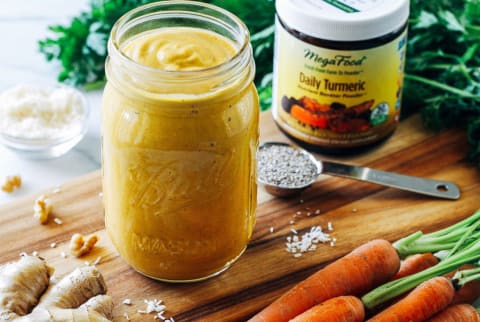Advertisement

These days, there is literally a supplement for everything. Stressed out? Time for some magnesium. Trouble sleeping? Melatonin to the rescue. The sheer variety of products out there makes it easier than ever to fill in any nutritional gaps and feel more vibrant and nourished every day. However, the expanding supplement market also means that you need to pay more attention than ever to the quality of product you’re using. These days, not-so-healthy compounds like artificial colors, hydrogenated oils, and even lead1 have been found in certain supplements. Yuck.
Perhaps one of the most pervasive—and potentially dangerous—things that could make its way into supplements is herbicides, particularly glyphosate.
What is glyphosate, and is it harmful?

First sprayed in 1974, the weed killer has become the most commonly used herbicide in the United States, its use skyrocketing with the introduction of GMO crops.
Even though two-thirds of glyphosate applications are made on U.S. soil, our country actually knows relatively little about its impact on human health. While certain watchdog organizations like the Environmental Protection Agency have deemed it safe, others like the International Agency for Research on Cancer have declared it a probable carcinogen.
Robyn O'Brien, the renowned environmental activist, clean food advocate, and best-selling author behind The Unhealthy Truth, explains why this question mark over glyphosate could be cause for concern in saying, "If you buy the weed killer at a store, on the side of the bottle, it will say, 'Keep out of reach of children.' And yet we now find that that same herbicide is routinely applied to the products we eat and the products we feed our children. As a mother of four, I’m thinking, 'Holy smokes, families are consuming this in record doses, and we haven't had the conversation about it.'"
How to avoid glyphosate in your food and supplements.
O’Brien would rather play it safe than risk consuming something that could be harmful. "Any time you have a he-said, she-said scientific debate, I ask what we can be doing to exercise precaution," she says. "How can we reduce our exposure to something that may cause harm?"
Eating organic food is one way to start. But O’Brien also remains wary around any products that can contain corn and soy (two commonly sprayed crops) fillers, such as supplements.
"We’re finding that glyphosate is pervasive in so many different things because our soil has been increasingly treated with it over the years. It can be found across a lot of different ingredients and products."
When it comes to feeding her family, O’Brien always looks for the USDA Organic seal, and as far as supplements go, she trusts MegaFood®—the first supplement brand to have its entire line certified Glyphosate Residue Free by The Detox Project, an independent research and certification organization.
By committing to a level of transparency beyond organic, the company is putting out products you know you can feel good about. They use real, whole ingredients like oranges, turmeric, and tart cherry in their Daily Turmeric Nutrient Booster Powder™ and beet root in their Blood Builder®, all of which are super clean and effective.
By supporting brands like MegaFood, you’re sending a message that transparency is king, and consumers won’t settle for question marks.
